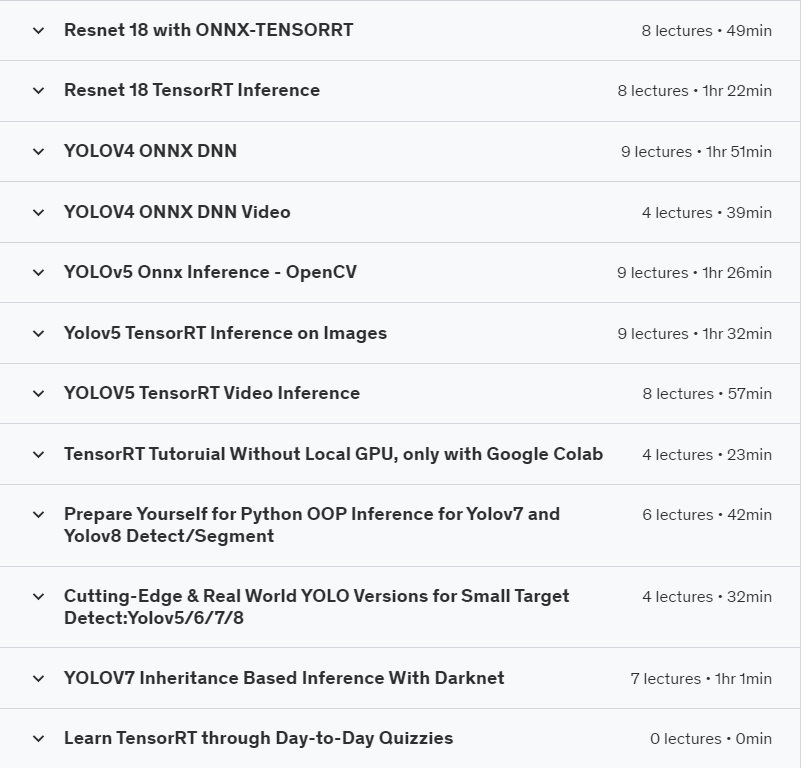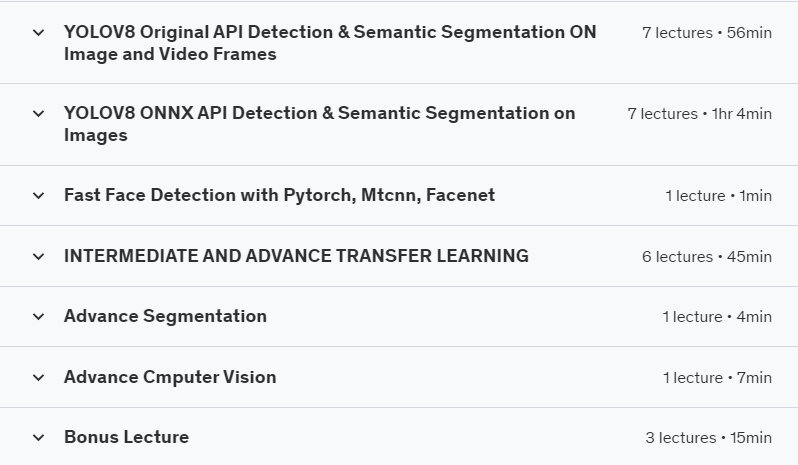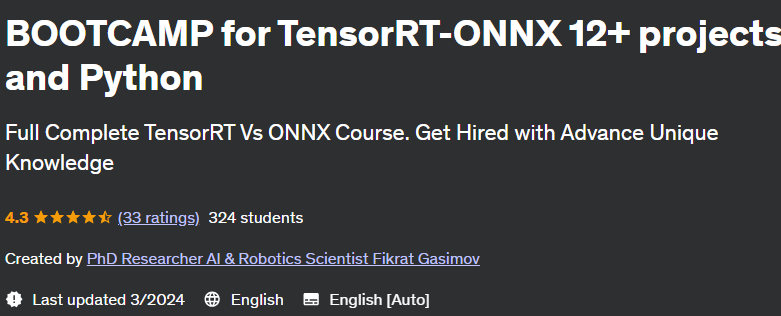Description
BOOTCAMP course for TensorRT-ONNX 12+ projects and Python. This course is mainly intended for any student (student, engineer, expert) who is highly motivated to learn deep learning model training and deployment. Candidates will have deep knowledge of Docker, use of TENSORFLOW, PYTORCH, KERAS models with DOCKER. In addition, they will be able to optimize deep learning models with ONNX and TensorRT frameworks for deployment in various sectors such as edge devices (nvidia jetson nano, tx2, agx, xavier, qualcomm rb5, rasperry pi, photon/photon2 particles, quantization ), AUTOMATIVE, ROBOTICS and also cloud computing through AWS, AZURE DEVOPS, GOOGLE CLOUD, VALOHAI, SNOWFLAKES. Using TensorRT and ONNX on Edge devices: Edge devices have a built-in hardware accelerator with nvidia gpu that enables real-time inference acceleration up to 20x faster to achieve fast and accurate performance.
- nvidia jetson nano, tx2, agx, xavier: jetpack 4.5/4.6 cuda accelerative libraries
- Qualcomm rb5 with Monoculare Camera and Stereo Vision (CSI/MPI, USB Camera)
- Photon/Photon2 IoT particles to access Web API, through speech recognition systems, for smart home
- Robotics: Robot operating systems packages for monocular cameras and stereo vision, for 3D relaxation, for human tracking and pursuit, unusual target and noise detection (gunfire, very high background noise)
- Raspberry Pi 3A/3B/4B gpu based OpenGL compiler
Using TensorRT and ONNX in robotic devices:
- An overview of Nvidia devices and the Cuda compiler language
- Familiarity with OpenCL and OpenGL
- Training and installation of Docker from scratch
- Prepare DockerFiles, Docker Compose as well as Docker Compose Debug file
- Python implementations and codes through Jupyter notebooks as well as Visual Studio codes
- Configure and install plugin packages in Visual Studio Code
- Training, installation and configuration of frameworks such as Tensorflow, Pytorch, Kears with Docker images from scratch
- Preprocessing and preparing deep learning datasets for training and testing
- OpenCV DNN
- Training, testing and validating deep learning frameworks
- Conversion of pre-made models to Onnx and Onnx Inference on images
- Convert onnx model to TensorRT engine
- TensorRT engine inference on images and videos
- Comparison of obtained metrics and results between TensorRT and Onnx Inference
- Get ready to learn object oriented programming in Python!
- In-depth knowledge of large Yolov5 P5 and P6 models
- Deep knowledge in Yolov5/YoloV6 architecture and their use cases
- Theoretical and practical deep coding skills in Yolov7/Yolov8 small and large models research paper
- Enhancing TensorRT knowledge for beginner level exams
- Enhancing TensorRT knowledge for intermediate level tests
- Increase knowledge of TensorRT for advanced level tests
- Enhancing Nvidia drivers for beginner/intermediate/advanced practical and theory tests
- Increased Cuda runtime for beginner/intermediate/advanced practical and theory tests
- Strengthen your OpenCV-ONNX knowledge by taking combined practical and theory tests
- Beginner ONNX and advanced Python coding skills to automatically tune meta-parameters and inputs to the Yolov8 ONNX model (rapid image or video processing before sending) for semantic recognition and segmentation
- Deep reinforcement training with practical examples and deep Python programming like Game of Frozen Lake, Drone of Lunar Ladder, etc
- Custom training models for beginners, intermediate and advanced
- Beginner, intermediate vs. advanced object classification
- Beginner, intermediate vs. advanced object localization and detection
- Beginner, intermediate vs. advanced image segmentation
What you will learn in BOOTCAMP for TensorRT-ONNX 12+ projects and Python course
-
1. What is Docker and how to use Docker and their practical application
-
2. What is Kubernet and how to use it with Docker and their practical application
-
3. Nvidia SuperComputer and Cuda programming language and their practical application
-
4. What are OpenCL and OpenGL and when to use them and their practical application
-
6. (LAB) Tensorflow/TF2 and Pytorch installation, configuration with DOCKER
-
7. (LAB) Configure DockerFile, Docker Compile and Docker Compose Debug
-
8. (LAB) Different versions of YOLO, comparisons and when to use which version of YOLO according to your problem
-
9. (LAB) Jupyter notebook editor as well as Visual Studio programming skills
-
10. (LAB) Visual Studio Code Setup and Docker Debugger with VS
-
11. (LAB) What is ONNX fframework and how to use onnx application for your custom problems
-
11. (LAB) What is the TensorRT Framework and how to apply it to your custom problems
-
12. (LAB) Custom detection, classification, segmentation and inference problems on images and videos
-
13. (LAB) Object Oriented Programming Python3
-
14. (LAB) Pycuda language programming
-
15. (LAB) Deep Learning Problem Solving Skills in Edge Devices and Cloud Computing
-
16. (LAB) How to generate high-performance inference models, in order to achieve high accuracy, FPS detection, as well as less consumption of gpu memory.
-
17. (LAB) Visual Studio Code with Docker
-
18. (lab challenge) inference yolov4 onnx with opencv dnn
-
19. (lab challenge) yolov5 onnx inference with opencv dnn
-
20. (lab challenge) yolov5 onnx inference with Opencv DNN
-
21. (Lab Challenge) Deducing yolov5 onnx with TensorRT and Pycuda
-
22. (LAB) ResNet image classification with TensorRT and Pycuda
-
23. (LAB) yolov5 onnx inference on video frames with TensorRT and Pycuda
-
24. (LAB) Get ready to infer object-oriented programming in Python!
-
25. (LAB) Python OOP inheritance based on YOLOV7 object recognition
-
26. Deep theoretical knowledge about small target detection and image coverage
-
27. Deep insight into Yolov5/Yolov6/Yolov7/Yolov8 architecture and practical use cases
-
28. Deep insight into YoloV5 P5 and P6 models and their practical use
-
29. Key Differences: Explicit vs Implicit Batch Size
-
30. (theory) TenSorRT profile optimization training
-
31. (Theory) Strengthen TensorRT knowledge for beginner level exams
-
32. (Theory Challenge) Reinforce knowledge of TensorRT for intermediate level tests
-
33. Theory Challenge) Enhancing TensorRT Knowledge for Advanced Level Tests
-
34. (Theory challenge) Cuda runtime increase for beginner/intermediate/practical tests and advanced theory
-
35. (Theory Challenge) Strengthen your OpenCV-ONNX knowledge by taking combined practical and theoretical tests
-
36. (Deep theoretical knowledge) Inference of input and output of YoloV8 ONNX model
-
37. (Deep theoretical knowledge) YoloV8 Model usage and functional parts.
-
38. (deep practical knowledge) YoloV8 ONNX model for detection and segmentation
BOOTCAMP for TensorRT-ONNX 12+ projects and Python course is suitable for people who
- New graduates
- students of University
- Artificial intelligence experts
- Embedded software engineer
- Robotics engineer
BOOTCAMP course specifications for TensorRT-ONNX 12+ projects and Python
Course topics on 3/2024
BOOTCAMP course prerequisites for TensorRT-ONNX 12+ projects and Python
- basic python programming knowledge
- basic deep learning knowledge
- PC Laptop with CPU or GPU
Images of BOOTCAMP course for TensorRT-ONNX 12+ projects and Python
Sample video of the course
Installation guide
After Extract, view with your favorite Player.
Subtitle: None
Quality: 720p
download link
File(s) password: www.downloadly.ir
Size
5.4 GB


